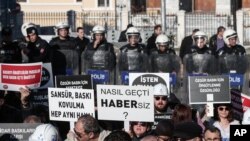ISTANBUL —
In Turkey, the government is accused of engaging in a cyber war against its opponents. Those opponents have taken to social media to organize protests and spread allegations of high-level government corruption.
Last month’s local election victories for Prime Minister Recep Tayyip Erdogan’s AK Party coincided with cyber attacks on several newspapers that are critical of the government and the Cihan news agency, which is owned by an opponent of the prime minister.
"This problem started on Election Day," said Chief technical officer Yusuf Kenan of Cihan News agency. "We get the d-dos attack. D-dos means very much traffic to our infrastructure so that our customers cannot get their service because of this traffic. We have these kinds of attacks but not so much big attack; we get especially 10-gigabit attack. But in election time hundreds of gigabit attack."
Kenan was reluctant to point the finger at the government. But Zaman newspaper columnist and journalist Sevgi Akarcesme, whose paper too was hit by a cyber attack is in little doubt.
"Today’s Zaman and Zaman have become the direct target of the Prime Minister Recep Tayyip Erdogan in Turkey, and starting from the election night Today’s Zaman and Zaman websites all have been blocked for a while. It's part of systematic cyber attack. Of course we don’t have any official documents proving these government attacks, but you’ve got to be insane not to realize this was not organized by the government," said Akarcesme.
The government strongly denies the allegations. But such newspapers have been on the forefront of publishing allegations of high-level government graft, much of it implicating Prime Minister Erdogan and his family.
Erdogan continues to tour the country insisting he is a victim of a national and international conspiracy to unseat him, and that social media sites like Twitter and YouTube are key elements of the plotters. Many of the graft allegations appeared on both sites, resulting in a ban against them, and joining some 40,000 other sites blocked by Turkish authorities. Senior Twitter officials flew to Ankara this month to hold high level government talks. Following the meeting, deputy Prime Minister Besir Atalay expressed satisfaction.
He says Twitter now toes the line. Actually, Twitter was already doing this in other countries. He said our country would not experience any problems in the future. In this regard, we don’t have any problem with social media.
Following its meeting in Ankara, Twitter blocked two key accounts used for distribution of graft allegations. The blocking of the sites has caused concern among advocates of freedom of expression and Internet freedom in Turkey. Yaman Akdeniz, an expert on Cyber freedom at Istanbul’s Bilgi University, successfully challenged the government’s Twitter ban in Turkey’s constitutional court. He says he is now worried about Twitter priorities.
"A visit from Twitter officials and subsequent to that immediate removal or blocking of certain Twitter accounts suggests that they're much more concerned about their own interests, rather than freedom of expression," said Akdeniz. "I am very much concerned, because if you start obeying one court order and then [there] will be another court order asking them to provide IP addresses and personal information of certain Twitter accounts. And this knowledge of Twitter assisting Turkish authorities may have chilling effect on all Turkish Twitter users."
Turkish authorities appear to be stepping up their effort to enforce bans on websites. Google last month accused Turkish authorities of blocking its Domain Name System, which has been widely used in Turkey to circumvent bans. Analysts say Turkey remains polarized, and that polarization is only expected to deepen with presidential elections this August. The battle over the Internet can only become more intense. It is a battle that the government appears determined to win.
Last month’s local election victories for Prime Minister Recep Tayyip Erdogan’s AK Party coincided with cyber attacks on several newspapers that are critical of the government and the Cihan news agency, which is owned by an opponent of the prime minister.
"This problem started on Election Day," said Chief technical officer Yusuf Kenan of Cihan News agency. "We get the d-dos attack. D-dos means very much traffic to our infrastructure so that our customers cannot get their service because of this traffic. We have these kinds of attacks but not so much big attack; we get especially 10-gigabit attack. But in election time hundreds of gigabit attack."
Kenan was reluctant to point the finger at the government. But Zaman newspaper columnist and journalist Sevgi Akarcesme, whose paper too was hit by a cyber attack is in little doubt.
"Today’s Zaman and Zaman have become the direct target of the Prime Minister Recep Tayyip Erdogan in Turkey, and starting from the election night Today’s Zaman and Zaman websites all have been blocked for a while. It's part of systematic cyber attack. Of course we don’t have any official documents proving these government attacks, but you’ve got to be insane not to realize this was not organized by the government," said Akarcesme.
The government strongly denies the allegations. But such newspapers have been on the forefront of publishing allegations of high-level government graft, much of it implicating Prime Minister Erdogan and his family.
Erdogan continues to tour the country insisting he is a victim of a national and international conspiracy to unseat him, and that social media sites like Twitter and YouTube are key elements of the plotters. Many of the graft allegations appeared on both sites, resulting in a ban against them, and joining some 40,000 other sites blocked by Turkish authorities. Senior Twitter officials flew to Ankara this month to hold high level government talks. Following the meeting, deputy Prime Minister Besir Atalay expressed satisfaction.
He says Twitter now toes the line. Actually, Twitter was already doing this in other countries. He said our country would not experience any problems in the future. In this regard, we don’t have any problem with social media.
Following its meeting in Ankara, Twitter blocked two key accounts used for distribution of graft allegations. The blocking of the sites has caused concern among advocates of freedom of expression and Internet freedom in Turkey. Yaman Akdeniz, an expert on Cyber freedom at Istanbul’s Bilgi University, successfully challenged the government’s Twitter ban in Turkey’s constitutional court. He says he is now worried about Twitter priorities.
"A visit from Twitter officials and subsequent to that immediate removal or blocking of certain Twitter accounts suggests that they're much more concerned about their own interests, rather than freedom of expression," said Akdeniz. "I am very much concerned, because if you start obeying one court order and then [there] will be another court order asking them to provide IP addresses and personal information of certain Twitter accounts. And this knowledge of Twitter assisting Turkish authorities may have chilling effect on all Turkish Twitter users."
Turkish authorities appear to be stepping up their effort to enforce bans on websites. Google last month accused Turkish authorities of blocking its Domain Name System, which has been widely used in Turkey to circumvent bans. Analysts say Turkey remains polarized, and that polarization is only expected to deepen with presidential elections this August. The battle over the Internet can only become more intense. It is a battle that the government appears determined to win.



